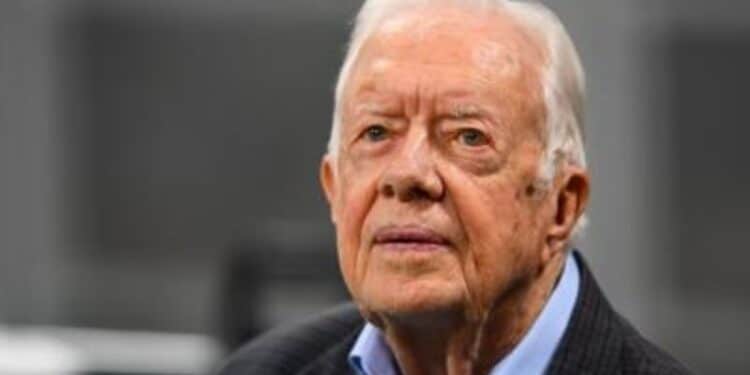Today, October 1, 2024, Jimmy Carter marked a historic milestone by becoming the first U.S. president to reach the centennial age of 100 years. This extraordinary achievement highlights Carter’s longevity and signifies a remarkable journey filled with significant contributions to American society and the global community. As Carter celebrates this important birthday, public and political figures alike have expressed their admiration and respect for his unwavering dedication to public service.
Jimmy Carter: A Century of Service and Legacy
The announcement of Carter’s imminent centenary has led to an outpouring of warm wishes from citizens and officials across the political spectrum. Remarks from prominent political leaders underscore his values of compassion, humility, and commitment to humanitarian efforts. These tributes demonstrate the rare ability of Carter to transcend party lines, reflecting a consensus on the importance of his legacy in shaping American values and policies. His lifelong advocacy for peace, human rights, and environmental stewardship serves as a guiding light for future generations.
Carter’s centennial birthday also invites reflection on the historical context surrounding his presidency from 1977 to 1981. The Camp David Accords, which brokered peace between Israel and Egypt, and the establishment of the Departments of Energy and Education, were notable initiatives during his administration. Furthermore, his post-presidency efforts through the Carter Center epitomize his relentless pursuit of social justice and public health improvements worldwide. This milestone moment not only celebrates Carter’s achievements but also underscores the significant impact a president can have in their lifetime.
In essence, Jimmy Carter turning 100 is a monumental occasion that reflects on his extraordinary life and enduring legacy. It invites all to acknowledge the vital role he has played in American history and to consider the implications of such a legacy as future leaders emerge.
A Look Back at Jimmy Carter’s Presidency
Jimmy Carter served as the 39th President of the United States from January 20, 1977, to January 20, 1981. His presidency is often characterized by a range of significant events, policies, and challenges that had long-lasting effects on both domestic and foreign affairs. One of the hallmark achievements of his administration was the emphasis on human rights. Carter believed that protecting human rights abroad was crucial to U.S. foreign policy, which led to a more principled stance against authoritarian regimes.
Among the notable policies enacted during his presidency was the establishment of the Department of Energy and the Department of Education, which underscored his commitment to energy conservation and educational reform. Carter faced the energy crisis of the late 1970s, prompting him to introduce measures to reduce energy consumption and transition the country towards alternative energy sources. His administration advocated for energy efficiency, culminating in the implementation of several policies aimed at addressing the nation’s reliance on foreign oil.
The Iran hostage crisis, which began in November 1979 and lasted for 444 days, challenged Carter’s leadership and significantly impacted his presidency. The crisis arose when a group of Iranian students seized the U.S. Embassy in Tehran, taking American diplomats hostage. Carter’s administration made numerous attempts to resolve the crisis diplomatically, yet the situation deteriorated, ultimately culminating in a botched rescue operation known as Operation Eagle Claw. This failure severely affected his popularity and was seen as a defining moment of his presidency.
Despite these difficulties, Carter’s legacy includes a focus on diplomacy, which is best exemplified by the Camp David Accords, which established a peace treaty between Israel and Egypt. This achievement marked a milestone in Middle Eastern diplomacy and set a precedent for future peace efforts in the region. Carter’s presidency remains a complex chapter in American history, reflecting the struggles and the advancements that shape the contemporary political landscape.
Post-Presidency: Carter’s Continued Impact
After leaving the presidency in 1981, Jimmy Carter embarked on a profound journey of service that would reshape his legacy and influence across the globe. Unlike many former presidents, Carter dedicated himself wholeheartedly to humanitarian efforts, demonstrating an unwavering commitment to peace, democracy, and health. His establishment of the Carter Center in Atlanta, Georgia, marked a pivotal moment in his post-presidential life. This non-profit organization aimed to improve global health, foster democratic governance, and mediate conflict resolution, embodying Carter’s belief in constructive engagement.
Under Carter’s stewardship, the Carter Center has played a crucial role in combating diseases such as Guinea worm disease and assisting in the monitoring of elections in politically unstable regions. The organization’s initiatives, driven by a focus on health equity and human rights, have positively impacted millions around the world. Moreover, the centre’s work on mental health and well-being highlights the scope of Carter’s commitment, emphasizing holistic approaches to community health.
Carter’s post-presidential engagements also include extensive writing, where he has authored numerous books addressing various subjects ranging from politics to theology. These works reflect his deep understanding of complex issues and his desire to inspire dialogue and action among readers. His literary contributions have earned him recognition and respect as a thought leader, extending his influence beyond traditional political boundaries.
In 2002, Carter was awarded the Nobel Peace Prize for his decades-long commitment to peace-building and humanitarian efforts. This accolade recognized not merely his presidential leadership but also his tireless work in advocating for global health and democracy. Even in his later years, Carter’s voice remains a guiding force in discussions on international relations and human rights, highlighting that public service transcends the confines of political office. His life exemplifies the essence of lifelong dedication to humanity.
Reflections on Aging and Legacy: Lessons from Jimmy Carter
As we contemplate the remarkable journey of Jimmy Carter, we recognize the profound lessons that emerge from his life, especially regarding ageing and the legacy one leaves behind. Throughout his centennial years, President Carter has exemplified resilience, demonstrating that strength is not merely found in youth, but rather in the commitment to service and continuous engagement with the world. His ability to adapt to the challenges of ageing serves as an inspiring reminder that one can continue to contribute meaningfully to society at any stage of life.
Carter’s dedication to public service is a cornerstone of his legacy. Even in his advanced years, he remains active in humanitarian efforts, particularly through his work with Habitat for Humanity and his advocacy for global health initiatives. This conviction illustrates a powerful message about the importance of service. As individuals reflect on their own lives, they may find inspiration in Carter’s example, encouraging them to seek opportunities to engage with their communities and support those in need. Service not only enriches the lives of others; it also provides the individual with a sense of purpose and fulfillment.
Moreover, Carter’s perspective on life offers valuable lessons on how to approach ageing with grace and positivity. He openly discusses the realities of growing older, acknowledging both the physical limitations and the emotional responses associated with this phase of life. In doing so, he challenges societal perceptions of ageing, advocating for a viewpoint that emphasizes wisdom, continued learning, and meaningful contributions instead of retreat and resignation. His life invites us to reflect on the legacy we wish to create, prompting individuals to consider how actively engaging in service and maintaining a vibrant spirit can shape a lasting impact on both their own lives and the lives of others.










